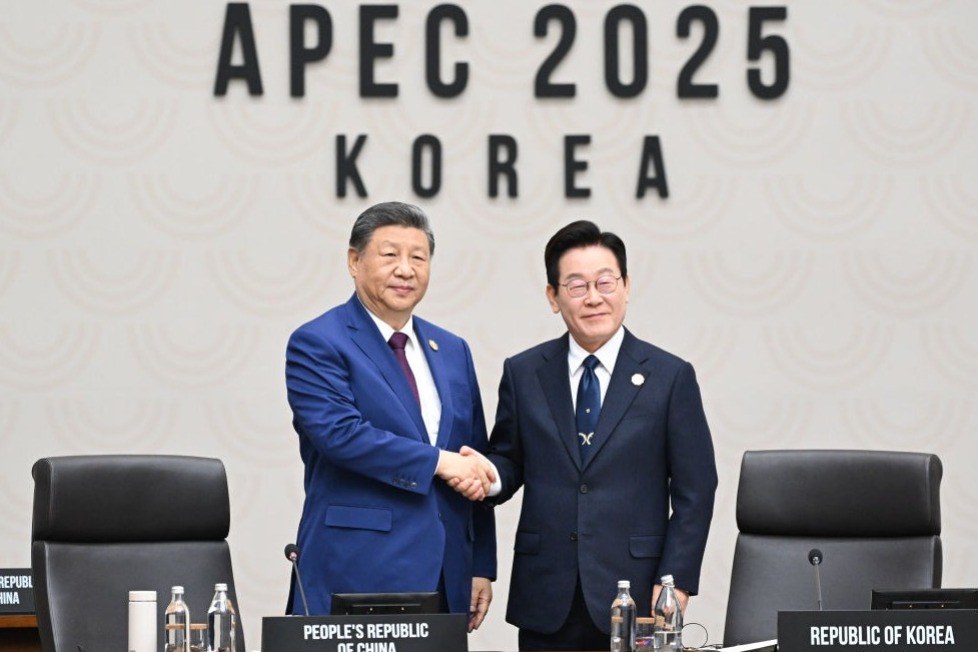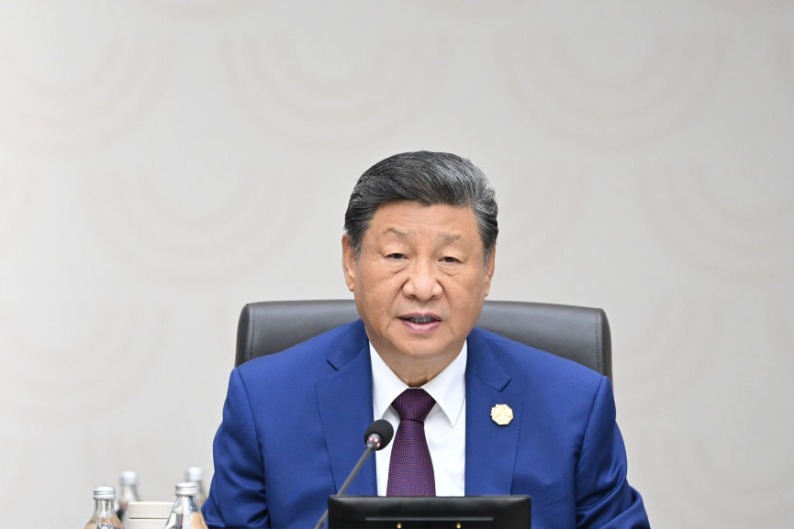Crisis or opportunity: traditional automakers in EV race
China.org.cn | Updated: 2024-04-30 13:54

Editor's note: The following article is the result of joint efforts of the Beijing Municipal People's Government Consultation Office and the Cloud River Urban Research Institute. Delving into the changing global auto industry landscape, the article analyzes the challenges facing established automakers like Toyota and the advantages of emerging players, and provides insights into the future development of the industry.
As global awareness of climate crisis and efforts toward carbon reduction intensify, countries around the world have rushed to slap bans on the sale of gasoline-powered vehicles. This has given a boost to new energy vehicles, setting off a wave of electrification in the auto industry. According to data provided by Clean Technica, 13.69 million electric vehicles (EVs) were sold in 2023, accounting for 16 percent of the global car sales.
However, the EU has recently made a U-turn and lifted its ban on the sale of gasoline cars by 2035; Mercedes-Benz has backed off its plan to only sell EVs by 2030; and Apple has disbanded its decade-long investment in car research and development. These surprising moves have sparked discussions both in China and abroad.
Toyota's stance on EVs has grabbed particularly great attention. Toyota Motor Chairman Akio Toyoda has repeatedly expressed skepticism about electric cars. In January, he boldly stated that battery EVs will reach at most 30 percent market share while the remaining 70 percent will be taken up by hybrids, hydrogen fuel cell and fuel-burning cars. In response, Tesla CEO Elon Musk expressed his disagreement on X.
Toyota sold 112.33 million cars in 2023, remaining the world's largest carmaker for four consecutive years. However, Toyota only sold 104,000 pure EVs, making up less than 1 percent of its total sales. That indicates the Japanese automaker has lagged behind in the EV race.
1. EVs reshape global auto industry
China, Europe, and the US are three major EV markets. In 2023, EV sales in China accounted for 63.5 percent of the global total, Europe 21 percent, and North America 10 percent. Japan, although the largest automaker in terms of vehicles sold, only accounted for 1 percent, hanging back behind other developed countries.
BYD was the largest EV maker in the world in 2023, followed by Tesla. The two automakers combined accounted for 34.2 percent of the global EV sales. Among the top 20 EV manufacturers worldwide, Chinese companies hold 10 spots, contributing to 42 percent of the global total. Buoyed by strong sales of EVs, China surpassed Japan last year to become the world's biggest auto exporter. Even though Toyota has made into the top 20 EV makers for the first time, its global market share was only 1.1 percent.
Tesla has been eclipsed by Toyota in auto sales, but it has outperformed Toyota and other automakers in the stock market. In October 2023, the total market capitalization of 62 large listed automakers worldwide was $2.21 trillion. In particular, Tesla's market value was $782.5 billion, 230 percent more than that of Toyota ranking second by market value. Tesla and third-ranked BYD combined contributed to 41.4 percent of the total value of the 62 companies, demonstrating investors favor newcomers to the EV market.
2. Hybrid or battery? Toyota's choice in new energy shift
During the fiscal period from April 2022 to March 2023, the sales revenue of Toyota came in at a record-breaking 37.15 trillion yen, while its profit slid to 2.73 trillion yen. In fact, approximately 70 percent of its profit comes from the Japanese market, which accounts for only 23.5 percent of Toyota's total car sales. This indicates that although Toyota is the global sales leader, it is the domestic market that bolsters the automotive juggernaut's profitability.
Gasoline vehicles still dominate the Japanese market. In 2023, EV sales in Japan hit 89,000 units, accounting for only 2.2 percent of car sales. Toyota, the reigning champion of gasoline vehicles, has actively downplayed EVs and even hindered the Japanese government's efforts to introduce EV policies, all in an effort to maintain its stronghold in the local market. In September 2021, during a Japan Automobile Manufacturers Association press conference, Akio Toyoda said if the Japanese government implemented an EV-centric policy for carbon neutrality, Japan would lose 5.5 million jobs and 8 million units of vehicle output by 2030.
The slow adoption of EVs in Japan is closely tied to Toyota's influence.
Interestingly, Toyota was one of the earliest traditional automakers to embrace new energy technologies. However, Toyota prioritized hydrogen vehicles instead of batter EVs.
Toyota began to develop hydrogen vehicles way back in1992. Both the Japanese government and Toyota have invested heavily in fuel cell vehicles and viewed developing fuel cell vehicles as the pathway to future auto development. Toyota holds over 50 percent of global patents related to hydrogen fuel cells.
In 2014, Toyota introduced Mirai, the world's first mass-produced hydrogen fuel cell car. However, due to its high price and inadequate hydrogen refueling infrastructure, its sales growth has been sluggish. As of July 2023, cumulative sales of fuel cell vehicles in Japan stood at a mere 8,283 units.
The slow adoption of hydrogen vehicles and the rapid growth of EVs caught Toyota off guard. Akio Toyoda's resistance to EVs may be an attempt to buy Toyota more time, but the company is facing its own "Nokia moment."
Toyota is taking a dual-approach pathway. On one hand, it has publicly expressed pessimistic views on the future of electrification. On the other hand, it has announced plans to launch 10 pure electric models by 2026. Additionally, Toyota is focusing on developing solid-state batteries as a game-changer for the EV industry. Compared to lithium-ion batteries, solid-state batteries offer shorter charging times, lighter weight, and longer range. Toyota aims to achieve mass production and commercialization of solid-state batteries by 2027-2028. Toyota secured substantial government subsidies up to 117.8 billion yen for such batteries' research and development.
Toyota has repeatedly delayed solid-state battery production timelines. Toyota faces intense competition, as battery manufacturer ProLogium Technology announced the world's first production line of solid-state batteries in February and Guangzhou Automobile Group announced in April the solid-state battery integration by 2026.
3. Three revolutions in EV industry
In 2010, Zhou Muzhi, a professor at Tokyo Keizai University, pointed out the challenges Toyota faced in developing EVs in his article "Toyota's True Crisis" published in Xinhua News Agency's Global magazine. The article forecast two crises for Toyota. First, Toyota lacked technologies for the EV battery. Second, as EVs avoid one-third of automotive components because of no need for an internal combustion engine, Toyota would not only lose its engine-related advantages but also make its engine suppliers and engineers become a burden. In contrast, new players in the EV market have no burdens, and many of them didn't even produce cars in the past. Toyota's challenge isn't purely technical; it's a structural issue. Zhou explicitly stated in the article, "Toyota, which reached its peak in the old industry environment and production model, will face challenges from emerging rivals like Tesla and BYD."
In the article, Zhou emphasized three revolutions sparked by EVs in the auto industry. The first is energy revolution: Electric cars have not only replaced gasoline cars, but also enabled integration with renewable energy, thus contributing to carbon neutrality. The second is artificial intelligence (AI) revolution: Electric cars have enhanced connectivity and intelligence in the industry. For investors, Tesla's value in the autonomous driving field even surpasses its EV production value. The third is manufacturing revolution: Traditional auto manufacturing processes have remained largely unchanged since Ford introduced the assembly line. However, with the advent of EVs, which eliminate the need for an internal combustion engine and reduce one-third of automotive parts, and advancements in production processes led by companies like Tesla, the automotive manufacturing process is undergoing a transformative revolution.
4. Auto industry entering 'Moore's Law era'
According to the "Global Electric Vehicle Outlook" report released by the International Energy Agency in April 2023, global EV sales will exceed 40 million units by 2030, and EV sales share will surpass 30 percent.
The rapid development of EVs presents both opportunities and challenges for the auto industry. While various car manufacturers are vying for a position in the EV market, some traditional automakers remain committed to gasoline vehicles and even express skepticism about electric cars.
In the race toward an intelligent driving future, Tesla, Huawei, Xiaomi, and other tech companies, have a competitive advantage over traditional automakers. Last year, Tesla unveiled its latest Full Self-Driving system and announced plans to launch autonomous taxi services by August this year. Meanwhile, tech giants like Huawei and Xiaomi, also payers in communications and AI, are entering the EV market, further pushing the industry toward smart mobility.
Moore's Law, first proposed in 1965, states that the number of transistors on a semiconductor chip doubles approximately every 18 months, while the cost of semiconductors decreases by half. This law has driven unprecedented technological progress across various domains. Zhou defines this era of rapid advancement as the "Moore's Law-driven age."
Zhou said the electronics industry was the first to be driven by Moore's Law, and became one of the fastest-growing sectors globally since the 1980s. With the rise of AI and its integration into automobiles, the auto industry is now a Moore's Law-driven sector. The competitive dynamics in the auto sector have fundamentally shifted, and it is the innovative tech companies that are leading this transformative era. Traditional automakers must grasp the logic of Moore's Law-driven industries to adapt and thrive in this changing landscape.
























